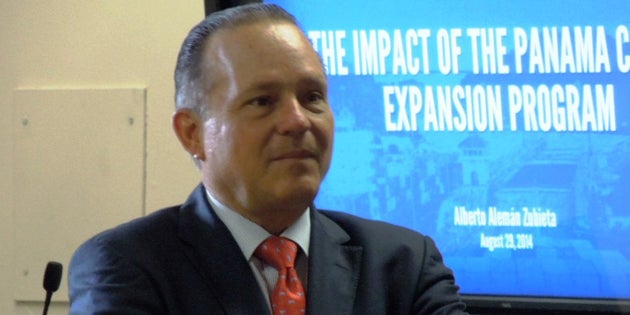Alberto Alemán Zubieta, former CEO of the Panama Canal Authority, says the Panama Canal isn’t about ships.
That’s one of the insights he shared when talking with MBA students from the College of Charleston School of Business. He shared his experiences from transitioning the Panama Canal from a non-profit to a for-profit business, and expanding it to handle post-panamax ships.
RELATED: Read more about Alberto Alemán Zubieta in Latin Trade.
1. It’s not about ships.
The Panama Canal Authority’s mission is “to produce maximum sustained benefit from our geographic position.”
“This made me aware of how important it is for businesses to use geography to their advantage,” says Larissa Steinfeldt, an MBA student from Aachen, Germany. “The mission has nothing to do with locks or ships because the Canal is just infrastructure.”
2. Be reliable.
When Alberto Alemán Zubieta became CEO, there were no guarantees for getting through the Canal in a timely manner.
He implemented a reservation process for ships, with a guarantee they’ll be through the Canal within 18 hours. The Panama Canal Authority saw their market share grow dramatically.
3. Be creative.
Alberto Alemán Zubieta saw an opportunity with the reservation system. The Authority holds a daily auction for an additional reserved spot with the bidding starting at $30,000. Companies have paid upwards of $250,000 in the auction.
4. The environment is important. Really important.
At first, teams of engineers were focused on how to expand the Panama Canal. They had a plan and were explaining it to Panamanians in terms of capacity, tons of cement, and new jobs created. But what the Panamanians cared about was the environmental impact and their communities.
“I would guess the environmental impacts were a major hurdle through the process. The environment is a big deal in business,” says Nate Smith, an MBA student from Santa Cruz, Cali. “One of our previous speakers said she won’t even have discussions with a company unless they’ve met certain environmental requirements.”
5. Take risks.
The decision to expand the Panama Canal doesn’t seem risky now, but it was in December 2008 when the financial package was approved at the beginning of the worst economy in recent memory.
6. Stay a step ahead.
“The Panama Canal Authority isn’t even done with this project and they’re already thinking about the next expansion,” says Clay Butler, an MBA student from Charleston, S.C. “Staying a step ahead is definitely something I want to do in my career.”
Alberto Alemán Zubieta predicts the amount of cargo passing through the Panama Canal will expand from seven million TEUs to 20 million in 2025. He expects the expanded Canal to reach its capacity in 2035, if not earlier.
Alberto Alemán Zubieta’s presentation is part of the one-year MBA program’s Mind Your Business Lecture Series, whichgives MBA students access to notable leaders from the worlds of business, finance, shipping, hotel management, non-profit, leadership and career development, and more.
Alberto Alemán Zubieta, a native of Panama City, Republic of Panama, is a graduate of the civil and industrial engineering schools of Texas A&M University. He served as CEO of one of the largest construction companies in the Republic of Panama, Administrator of both the Panama Canal Commission and the Panama Canal Authority. After 16 years of serving his country, Alberto Alemán Zubieta returns to the private sector as engineer and consultant in the logistics and project management field.





